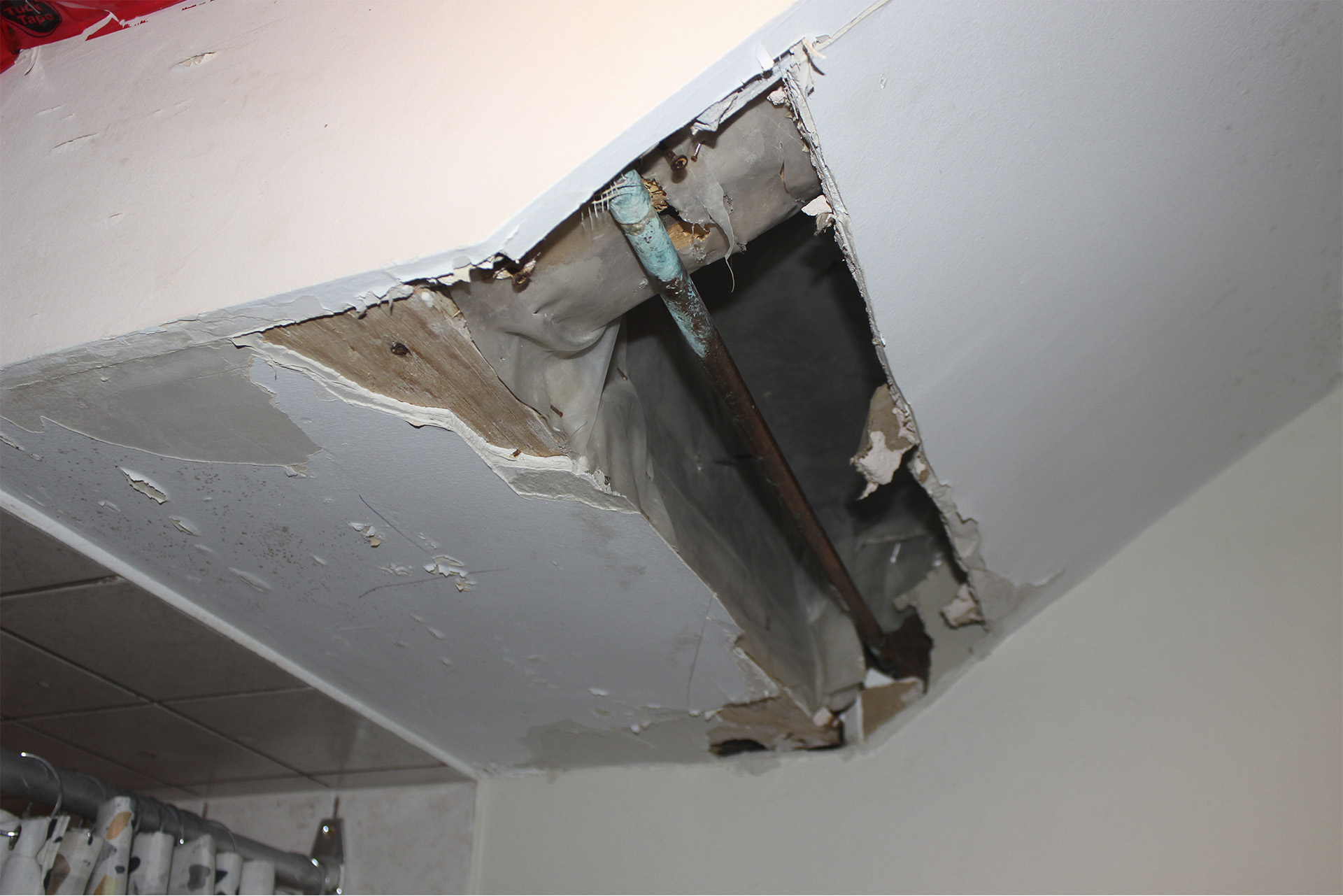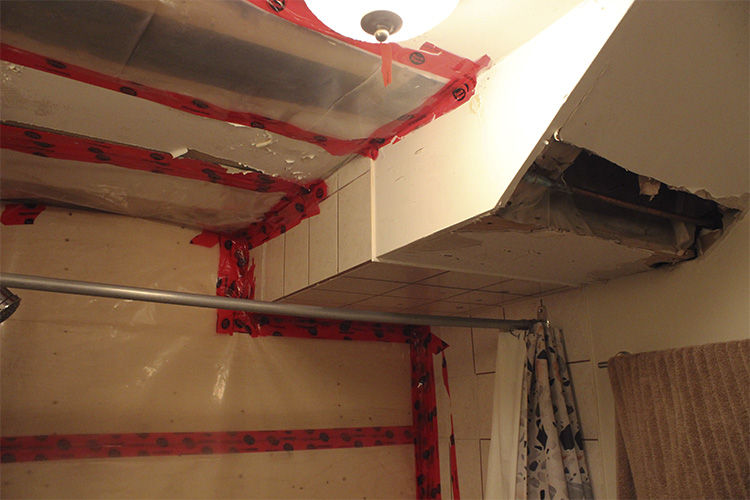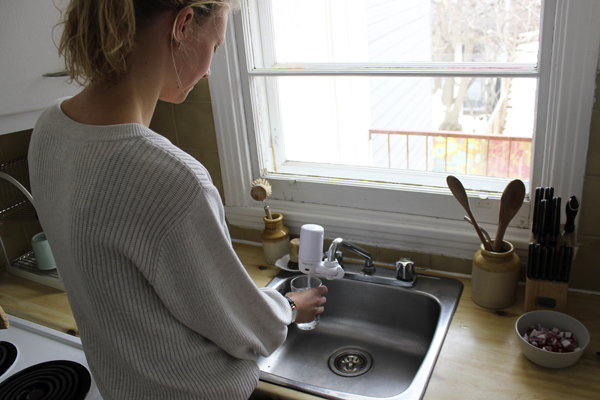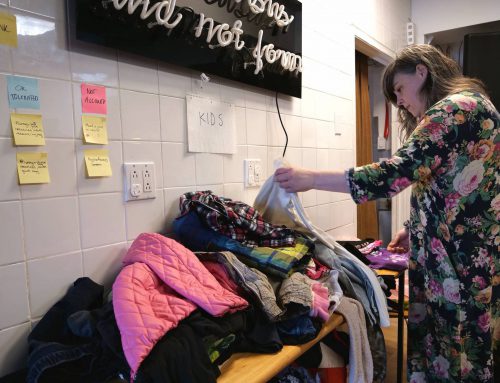BY Callie Giaccone & Jayda Pounder
Sarah Ouimette received a letter in November 2019 from Montréal about the high levels of lead in the pipes of her apartment building in the Plateau.
“I would’ve liked to have been advised before I moved in. The landlord never told me that there was lead in the water or that it was even a concern,” says Ouimette. “It was kind of concerning not knowing how big of an issue this is.”
Although the notice stated there were no health concerns and that new pipes would be installed soon, she hasn’t heard anything since.
Ouimette is not alone. Many tenants, landlords, and homeowners are in the dark about how the city is implementing its plan to replace all lead pipes.

Sarah Ouimette drinks filtered water. Photo by Callie Giaccone.
“It’s obviously of concern. I don’t think it’s as bad as someone who’s been exposed to it for a prolonged period of time, because I wasn’t here for a long time in my apartment,” says Elizabeth Sirois, whose NDG apartment has been affected by lead. “It’s concerning because I work in health care and know the effects of lead on IQ and all that stuff.”
Mayor Valérie Plante promised to speed up the process by replacing old pipes in houses and buildings that are affected as well as paying for the replacement. But some think Projet Montréal should be taking it a step further.
“A notice is one good way to get the word out, but the letter could have gotten lost in the mail or you never got it, so I think to just send out a letter and expect that everyone has read it is maybe not enough,” says Ouimette.
Despite Plante’s promise to provide free pitchers and filters for everyone who has been affected by the lead in their water, Ouimette had to buy a filter and install it on her tap.
“I feel safe now, I got a filter, it’s good, but I think the city could at least reimburse people for the filters,” says Ouimette. “It’s a small amount of money but why is this falling on the tenants out of everybody involved in this?”
Stefano Iacampo is the landlord of an apartment on Anderson St. that’s located near Place-des-Arts metro. His issues concerning pipes started with the city in 2018.
“I was never informed about the lead in the pipes, he says. “They called me asking if they could enter into our building, specifically in the basement room to check the pipes. Before you know it, they ripped up the floor, and now they think that it’s our responsibility to take care of it.”

Damage above Roberts’ toilet. Photo by Callie Giaccone.
Two years later, the tenants of the apartment continue to live with holes in their bathroom ceiling, as well as a torn up storage room.
According to Iacampo, he only found out about the torn up storage room because his tenants told him what happened after it was already done.
After two years of issues and damages with their apartment due to leaded pipes, tenants Jacob Roberts and Max Pelletier are fed up with their situation. Video by Callie Giaccone.
“Our insurance company hasn’t been the quickest in getting the ball rolling,” says Iacampo. “However, they blame a big part of their inefficiency on the city because of the lack of cooperation to move forward and get the job fixed. We are extremely lucky to have such amazing tenants because it is truly unfair how the city went about everything. I feel terrible.”
The city of Montreal started the construction work on Anderson St. so they could change the pipes coming in from the street.
According to Projet Montréal spokesperson Audrey Gauthier, when a wall of a building is less than 1.5 metres away from the sidewalk, the city must reconstruct it.
“The access to the water pipe to carry out the work was complex and required the disassembly of the floor [in Iacampo’s apartment building],” says Gauthier.

The damage in Roberts’ apartment lines the shower wall. Photo by Callie Giaccone.
And while city workers may have torn through the walls to access the pipes, they won’t be reconstructing those walls.
“The work to access the water pipe as well as the restoration are the responsibility of the owner,” says Gauthier. “The owner is responsible for carrying out the preliminary work to access the pipeline and repairing it after the work to replace the entrance it came in through.”
Worries of high levels of lead in pipes carry over to Montreal schools as well.
“They have signs up in the hallways at the drinking fountains that say to run the water for more than a minute and the one in our staff room says ‘don’t consume at all,’” says Amir Van Alphen, teacher at Royal West Academy. “It was definitely a little bit concerning to see the signs up.”
According to Van Alphen, the school installed new pipes a few years ago so the school is not directly affected and is not facing huge concerns. However, they still feel that they have to take precautionary measures.
The city still seems to be at odds with some Montrealers when it comes to implementing their plans on how to fix the lead water issue.
“Maybe in the future, if I moved into an apartment that I knew was old and there was a chance of lead, one of the requirements I’d need now from the landlord is to have a filter on the tap,” said Ouimette. “That should kind of be their responsibility.”
Find out whether or not your pipes have been affected by lead.
What are your rights as a tenant who’s been affected by lead? Media by Jayda Pounder.




